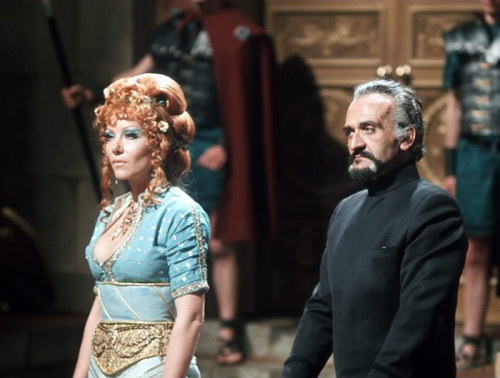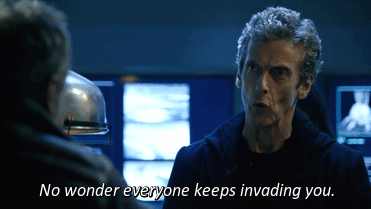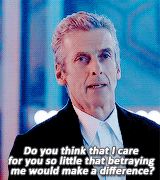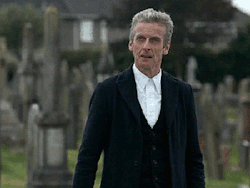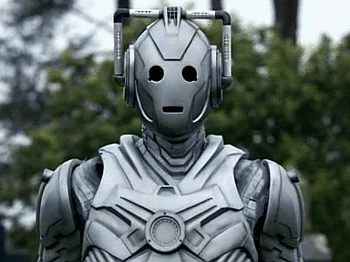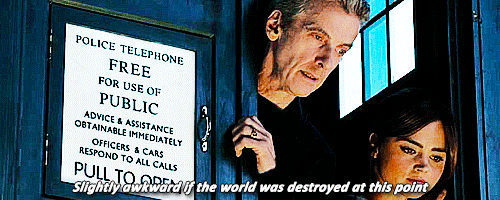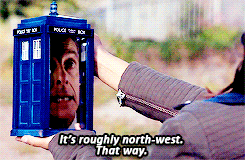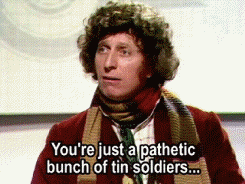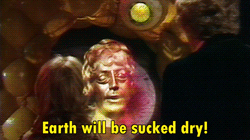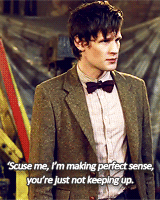Dark Water (Doctor Who) - Wikipedia, the free encyclopedia
Series 8, Story 11 (Overall Series Story #256a) | Previous - Next | Index
Where to start? (Start with the big hitter, my internal editor says, lead with the episode's best moment, then dance around it's other triumphs, acknowledge the wobbly bits -- there are always a few -- then circle back and close the loop ... ) But, if we're going to start with the best bit, then we have to know what the best bit is, and can you really know before the story's over? Well, I've got a pretty good idea, and I'll come to it shortly, but let's first be clear about what the best bit of the first half of the story was, on its own terms, and make sure we're not confusing any of the other razzle-dazzle for the singular best bit.
So, yes, Missy is the Master and that's not exactly surprising, but perhaps we're surprised Moffat didn't pull a double-plus red-herring on us. Missy was, we all speculated, either going to be a character we'd met before -- and the Master was the leading candidate in that category, probably favored by just a few points over River -- or she was going to be a new character we didn't fully appreciate the cleverness of yet. The reveal is not the best thing about this episode though.
Missy snogging the Doctor and then putting his hand on her chest, which turns out to mean so much more with benefit of hindsight -- the heteronormalized realization of digital reams of slash fiction -- is gobsmacking. Still not the best thing about this episode.
The death of Danny Pink was a shock. And Clara's reaction to it was ominous. That was all so well executed, it propelled us into the story like no other open has yet. But it wasn't the best thing about this episode.
Missy/the Master's engineering of a race of Cybermen is exactly the sort of thing we'd expect of the Master we knew. Delgado's Master, or Simms' Master, it's big, unnecessarily complex (they needed to be stored in Dark Water?) and unspeakably cruel. It is, of course, not the best thing about this episode though. Even though the echoing of
"The Invasion" and
"The Tomb of the Cybermen" is delightful fan service that, I'm certain, works perfectly well for those who haven't yet caught up to those classic stories, it too is not the best thing about this episode.
Missy telling humanity to "Bring out your dead," is the best assimilation of Monty Python into the series since John Cleese did art criticism of the TARDIS as an installation. Even that wasn't the best thing about this episode.
Danny Pink meeting up with the young boy he killed while serving was devastating, but there was something even more powerful and dramatic.
The best thing about this episode is the line I lead with in the title of this post. Really, it's the whole sequence that starts with Clara turning on her chipper voice when the Doctor answers her call and ends with him telling her to buck up before leaving the TARDIS after they've landed in the Nethersphere. But it is especially that line:
Do you think I care for you so little that betraying me would make a difference?
That is heart-breakingly beautiful writing. And Capaldi delivers it so matter-of-factly, with such understated glory. It's perfect. It is not only the best thing in this episode, it may be the best thing in
Doctor Who since ... well, ever?
That's a brasher claim than I'm accustomed to making, and I'll sleep on it, but flush from watching the episode twice, I'm feeling pretty good about it.
Let's back up though. Luck of the draw, I just finished watching the "The Time Monster," and am still drafting that post as I write this one, so a few things in this story resonated that much more for me on account of it being fresh. "The Time Monster" is a Master story, and a goofy one, where he, once again, gets himself in over his head by trying to control a being far more powerful than he himself is. (You'd think he'd learn ... and it remains to be seen whether she's got her army of Cybermen under her control in this one.) It's not only the Master though that ties the older story to this one. "TTM" starts with the Doctor dreaming of a volcano, and this story prominently features another dream sequence with a volcano. It's Clara's dream this time, but it feels more than just coincidence that dream imagery haunts this story. "TTM" also has the scene where the Doctor, trapped in an Atlantean dungeon with Jo Grant, shares a story from his boyhood -- and the Doctor's boyhood featured prominently this season in
"Listen" -- about his blackest day. That language echoes in Capaldi's Doctor telling Clara this is their darkest day, their blackest hour. Pertwee's Doctor, telling Jo about his blackest day, relates what is essentially a redressed Zen koan, firmly placing the Doctor in the Buddhist tradition. It's a lyrical moment that even the too-coy-by-half scripting ("It was the daisiest daisy...") and the ludicrous wig they put on Katy Manning can't cheapen.
It's that tradition Capaldi, I believe, is channeling when he explains to Clara that "Go to hell" wasn't curse he leveled at her, but instead an answer to the question of what they were going to do. This Doctor's response to being betrayed by his companion is very like Three's inability to leave the Master to be tormented by Kronos at the end of "TTM". (I'll save the rest of my thoughts on that for that write up, got to leave something to cover there.)
That line may be the most compassionate the Doctor has uttered in any of his incarnations. I often wonder what it is about
Doctor Who that it is so appealing to the alienated, the odd, the misfit. I don't say this to be cruel or judgmental; I plant my flag firmly in that territory. But if you've been to cons, or even just gone to the theater for a
DW event, you can't help but notice the demographic. Not to say all
DW fans are stereotypical nerds and outcasts, but not even
Star Trek conventions are as nerdstrong. The compassion, the injunction to have a brave heart and to be compassionate, even while being odd, is just the right message to appeal to the broadest cross-section of society. Across the LGBTQ+ and allies rainbow straight through to religious fundamentalists.
Anyone who has ever felt betrayed, and perhaps more importantly, anyone who has ever been selfish, and put themselves ahead of a friend at some point, and struggled with their conscience, has an ally and a champion in the Doctor. "Do you think I care for you so little that betraying me would make a difference?" He's weird and gawky, he comes across as cold and arrogant, but he always has Clara's back. She knew it in
"Deep Breath," though she had to be reminded here. (Her, "Fair enough," may even be better line reading than Capaldi's of his line. Anyone complaining that Clara isn't a developed a character, or has no emotional arc, at this point simply is not paying attention.) He cares so much. And we love him for it because we need that much care, we all do. And we all aspire to it, or know we ought to, even if we've ever pulled a Clara.
I'm looking forward to "Death in Heaven," but I don't think it's going to be possible to surpass what's already been accomplished. I'll come back at some point and revise this post to include some nitpicks and acknowledge the wobbly bits. But, for now, I just want to think about what a great line that was.
Notes to self for future revisions:
- Skepticism promoted as necessary tool for thinking about the problem. (That there is, for all intents and purposes, a sort of after-life here, need to sort out whether Moffat is fully convinced of the correctness of the Doctor's reliance on it. It *is* required, and "So ... an idiot, then," was such a great line, I should have included it in the things that could be confused for being the best thing about this episode.
- I've left much of the soldiering theme aside since "The Caretaker" but this is probably the place to talk more about Danny Pink and his experience in combat ... and what it means in the centenary year of the start of WWI, with the final episode airing on the eve of Remembrance Day. (We've seen the Doctor pin a poppy on his lapel before, after all ... )
Death in Heaven (Doctor Who) - Wikipedia, the free encyclopedia
Series 8, Story 12 (Overall Series Story #256b) | Previous - Next | Index
Spoilers
Stomp, stomp, stomp. That's the sound of Moffat marching us directly into the let down we knew was coming but hoped we'd be spared this time. Not that the episode was a complete failure; it had several moments of genius mixed in. The problem is those moments mixed into an overwrought mess of a story, the whole of which was less than its best parts.
When we remember this story, I suspect it'll be mostly for Michelle Gomez's fantastic turn as the Master. (Here's hoping that wasn't the last we've seen of her!) She pulls Simms's full camp interpretation through Mary Poppins and somehow makes that cohere into a genuinely villainous iteration of the classic that can withstand the Master's twice-baked, Goldberg Machine planning instinct and keep us engaged in a character that, by all rights, ought to collapse under the weight of its own silliness. (I'm over pining for the Derek Jacobi Master that could have been, we finally got an heir Roger Delgado could be proud of.)
We should be remembering it, based on how this season was constructed, for the arc of Danny Pink and how his fate intertwined with the relationship between Clara and the Doctor, as each of them wrestled with their own roles in all this adventuring. That resolution though was undercut by endings falling mostly flat. No fault of the actors here, they all did everything they could, it was the paces they were put through that derailed the story.
At this point, after all they've been through, they all needed to know they could stop lying to one another. Yes, the line about hugs hiding faces was poignant, but Clara and the Doctor should be living up to the friendship they profess and being honest with each other. Honest about matters of fact and honest about their feelings about the state of affairs. It was here, in the cafe where they hugged farewell, that the failure to learn and the failure to trust just fell flat. Dramatically, the scene didn't work either because we never believed this was really farewell. If anyone didn't suspect we were being set up again, then the appearance of Santa Claus and his announced that this had to be set right quickly settled the matter.
(So, yeah, when we write about this this, we have to deal with the fact Nick Frost, a casting coup, has been brought in to play a character who apparently believes, and has powers to back up that belief, that he is Santa Claus.
*sigh*
But, that's the beat that's been established. In new
Who, the Xmas specials are set up by things like Santa Claus or the Titanic crashing into the TARDIS.)
The ending was a low point -- the cafe ending, I mean, Santa interrupting the credit roll is something bizarre we'll have to wait and see about -- an off-key way to end the episode and the season, but it was exceeded in manipulative hokiness by the opening scene. Clara rattling off a bunch of continuity trivia to 'prove' to the Cybermen she's the Doctor, followed by her eyes replacing the Doctor's in the opening titles was a joke taken too far. I'm not against that sort of mixing of narrative and the formality of title sequences on principle, it's that it was done in the spirit of overselling an obvious ruse that rubs me the wrong way.
Bringing back Osgood to have Missy kill her also didn't sit right. Not because she was a likable character, one that I don't think I was alone in anticipating seeing more of, those sorts of characters are fair game and her murder by Missy sets the stage for as cold a glare as we've seen from the Doctor, effectively foreshadowing his resolve at the end to kill her despite their long, complicated history. Osgood's death, along with Seb getting deleted when he indulged in a moment of squee, felt a like cold-blooded rebuke of fandom's tendencies towards cosplay and ... well, squee. Which is odd, because I've never had the sense Moffat is anything but appreciative and respectful of fandom. The conclusion I'm leaping to is this is Moffat poking us in the eye with the intent to follow up later with a moral or lesson that'll be meant to guide fandom towards a deeper appreciation of the character than parroting "Bowties are cool."
I could be way off-base here an have to eat my words later, this may not be his intent at all, but it looks that way to me. If it is, I don't think it's needed. I think fandom is just fine the way it is. (Yes, I was one of those voices saying 'watch all these young'uns bail because Capaldi is old and grey,' which was criticism based on some less-than-generous assumptions about younger fans, especially the
Hunger Games demographic that probably could be pinned on some self-aggrandizing assumptions about my silver-haired, grew-up-with-Tom-Baker, had-a-long-scarf-before-many-of-you-were-even-born fan credentials.)
Going to go a step further and predict that we are definitely going to meet Kate's other daughter, Osgood's 'prettier' sister, at some point, and I expect she's also going to be played by Ingrid Oliver (though we shouldn't be surprised if Lorna Watson is in line for the role to make use of both halves of
the duo) in order to highlight the insecurities that inhibited Osgood and led her to hide behind big glasses and less-than-fashionable hair to go with her long scarf, bow tie, and red Converse. Dangerous business, trying to predict what Moffat's got in mind, but I don't think the Zygon making a point about wishing it could have taken on her sister's appearance instead of hers, Kate introducing herself to the Cybermen as "mother of two," and Missy's manipulation of Osgood by banging on her insecurities and desire to please the Doctor were all for nothing. It's whether they're part of a judgment on fandom that says, "You're doing it wrong," that concerns me. Unless, of course, it's more nuanced and affirming and we end up mourning Osgood while appreciating her sister in a way I'm not anticipating.
Osgood's death may turn out to not be the stumble I think it is, but I don't see how they could possibly bring Cyber Brigadier back to fix the mess that was made of raising him from the dead. Look, I'm a tremendous fan of the character and the actor who played him. (One of my dogs is named Brigadier for that very reason.) Again, it's not that I'm averse to paying tribute in the context of the show as a rule, it's the execution here in the context of this specific story. Kate was thrown out of the plane so she could be saved by her dad, and the Doctor could salute his old friend -- these two things both felt forced. Together, the effect is one of emotional manipulation, in an episode where we've got too much of that going on already.
Complicating matters is how this loving tribute to the Brigadier, one of only two human corpses capable of resisting Cyber programming, fits in with the overall theme of appreciating soldiers while remaining skeptical of militarism. Pink is devastating in his critique of the Doctor as the general who orders others to do the dirty work, and the narrative rewards Pink with a hero's end. He delivers a speech to rouse the troops (who don't need it, because they can't disobey their orders), promises the civilians that will sleep safely tonight thanks to his sacrifice, and then keeps his word. Yes, he suffers, but he gets to ease his conscience by bringing back the boy he killed when he served in the Middle East. Clearly, Pink is meant to be a model of heroism. But the Brigadier is one of those military types he, and the Doctor, are mistrustful and contemptuous of. A nuanced appreciation of the Brigadier would have held him accountable for his attempted genocide of the Silurians, a more bloody-handed old General than the Doctor, not presented him as one of the two humans with enough love in his heart to overcome Cyber programming.
The effect of this is to clump the acknowledged evils of the military mindset in with the tough decisions the Doctor makes (an individual, influencing people on an individual level) and excuse them both as being morally equivalent, as if we need to leave with murderous military bureaucracies to enjoy freedom from tyranny. This is a deeply cynical and defeatist attitude about human nature. Yes, we do need soldiers, because the world is horribly messed up. The Nazis and today's religious extremists attempting to impose their warped view of what makes a just society on the ravaged populations of the Middle East are expressions of fundamental flaws in our political systems on top of our imperfect understanding of history. Madmen and their armies have to be stopped. The problem is we need heroes to change minds, not only blow them apart. There's a fundamental imbalance, reflected in
Doctor Who, in the heroes we recognize. Remembrance Day/Veterans Day and Memorial Day honor those who served, and fell, in armed conflict with foreign enemies, but we owe the freedoms we enjoy as much to civil rights advocates, labor organizers, and the efforts of scientists, researchers, and medical professionals as we do to soldiers. Any chance we'll see a Labor Day special one of these years?
Doctor Who, at its best, celebrates humanist values, takes joy in exploration, and teaches empathy. There's some of that here, but it gets lost in the shuffle, overridden by the pressing need to stop the Cybermen. "Pain is a gift. Without the capacity for pain, we can't feel the hurt we inflict." The Doctor is spot on here. But in this case we're up against the clock. The Doctor needs to turn on Danny's inhibitor so doesn't feel pain, in order to get the information he needs (but should have figured out, honestly) about Missy's plans. Cyber Danny points out the problem here, all the speechifying is meaningless in the face of the need. But the message was too important to gloss over and a more effective drama would have found a way to preserve that.
Odds and ends:
- Cyber Zombie Brigadier flew away at the end. To self-destruct? Or is he, like Jenny, still out there somewhere?
- The clock in the cafe calls to mind this season's clock-themed opening titles animation.
- Moffat loves to make mirrors. The Doctor is offered armies twice in this episode. First the humans (improbably) make if C-in-C of all the armies of the world, then Missy attempts to give him the army of Cybermen.
- The dialogue was a bit rushed when the Doctor and Osgood were talking about Missy aboard the plane, but I gather he offered to show her all of time and space, making it all the more devastating that she dies instead of becoming a companion.
- "Hang on a second. The President? We don't want Americans bombing [or "bobbing"?] around the place. They'll only start praying." Snort laughed.
- The news broadcasts in the background at one point discuss how the Cybermen are flying this time, and that's new, so people remember them from "The Invasion" or from the events that led up to the Battle of Canary Wharf. And yet the first response to them emerging from St. Paul's this time is to take selfies with them? Srsly?
- Was shocked by the A.V. Club's A- rating and several other generally positive reviews for this episode. I was decidedly underwhelmed and expected more, harsher criticism. If not along my usual WTF doesn't anybody take Labor Day seriously?! lines, then for how goofy it ended up being overall. After watching it again though, I found myself enjoying it more, rather than less. Once I made it through all my eyebrow raising reactions and I-would-have-done-that-differently moments of the first viewing, it grew on me a little. Still wish


